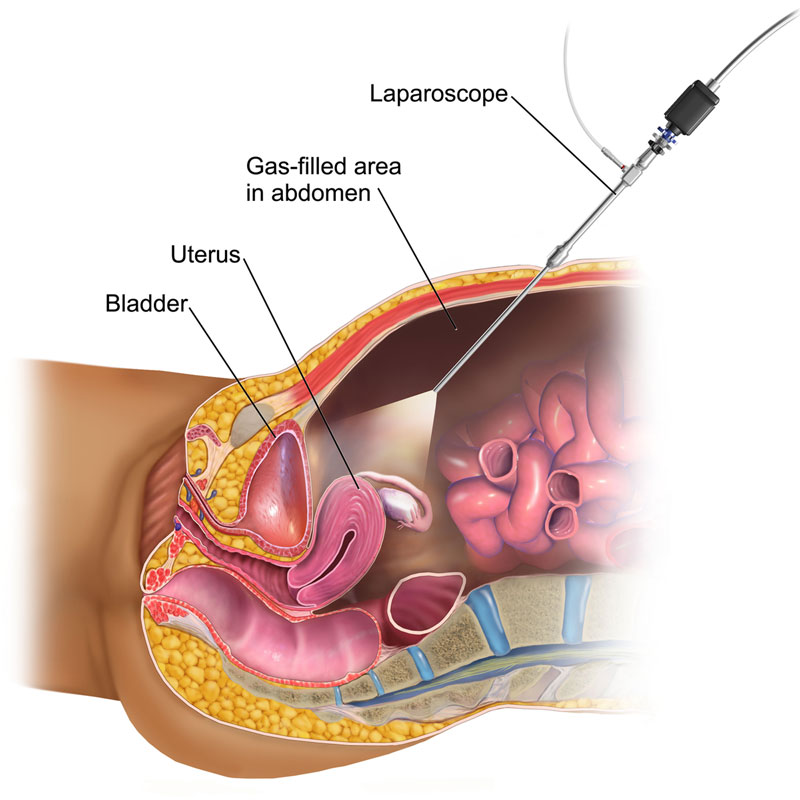What is Laparoscopic Surgery?
Laparoscopic surgery, also known as minimally invasive surgery or keyhole surgery, involves the use of small incisions and a camera (laparoscope) to perform operations. The procedure offers numerous benefits over traditional open surgery, such as less pain, minimal scarring, shorter hospital stays, and faster recovery. It is widely used for a variety of medical conditions, including gallbladder disease, hernias, and appendicitis, among others.
Key Objectives of Laparoscopic Surgery:
- Minimize Invasiveness: Using small incisions to reduce trauma to the body.
- Faster Recovery: Patients experience quicker recovery times, with fewer post-surgery complications.
- Lower Risk of Infection: Smaller incisions lead to a lower chance of infection and complications.
- Enhanced Precision: Laparoscopic tools and cameras allow for more accurate surgery.
Why Choose India for Laparoscopic Surgery?
India has become a global hub for laparoscopic surgery due to its world-class healthcare infrastructure, highly skilled surgeons, and affordable treatment options. The country offers advanced medical technologies and a high standard of care at a fraction of the cost compared to Western countries, making it an attractive destination for medical tourists.
Key Advantages of Choosing India:
- Affordable Treatment: Laparoscopic surgery in India is up to 70% cheaper than in Western countries, without compromising on quality.
- Expert Surgeons: India’s top surgeons specialize in laparoscopic procedures, offering years of experience in treating complex cases.
- Advanced Technology: Leading hospitals in India use the latest laparoscopic technologies, including robotic-assisted surgery.
- High-Quality Care: Accredited hospitals in India adhere to international medical standards, ensuring safety and quality.
- Seamless Medical Tourism: Healtour Solutions provides end-to-end support, including travel, visa, accommodation, and hospital coordination.
Types of Laparoscopic Surgeries Offered
Laparoscopic surgery is widely used for various medical conditions, providing effective solutions with less trauma to the body. Here are some common laparoscopic procedures offered by hospitals in India:
- Laparoscopic Appendectomy: Removal of the appendix for appendicitis using small incisions.
- Laparoscopic Cholecystectomy: Gallbladder removal surgery for conditions like gallstones.
- Laparoscopic Hernia Repair: A minimally invasive method to correct hernias with reduced recovery time.
- Laparoscopic Bariatric Surgery: Weight loss surgery for patients struggling with obesity, such as gastric bypass or sleeve gastrectomy.
- Laparoscopic Colorectal Surgery: Surgical treatment for conditions like colorectal cancer, Crohn’s disease, and diverticulitis.
- Laparoscopic Ovarian Cyst Removal: Removal of ovarian cysts using laparoscopic techniques for faster healing.
- Laparoscopic Urology Procedures: Kidney stone removal and other urological surgeries using minimally invasive techniques.
Why Laparoscopic Surgery?
Laparoscopic surgery offers numerous benefits over traditional open surgery, including:
- Minimal Scarring: Small incisions result in less visible scarring.
- Faster Recovery: Recovery times are significantly shorter compared to open surgery.
- Reduced Pain: The use of smaller incisions and less trauma results in less pain post-surgery.
- Shorter Hospital Stay: Most laparoscopic procedures are outpatient or require only a short hospital stay.
- Lower Risk of Complications: The smaller incisions lead to less risk of infection, bleeding, and other complications.
Symptoms Indicating the Need for Laparoscopic Surgery
Laparoscopic surgery is typically recommended for patients with various medical conditions, including:
- Chronic Abdominal Pain: Persistent pain in the abdominal area that doesn’t resolve with non-surgical treatments.
- Digestive Disorders: Conditions like gallstones, ulcers, or Crohn’s disease that require surgical intervention.
- Obesity: Obese individuals may be recommended for laparoscopic bariatric surgery to promote weight loss.
- Reproductive Issues: Ovarian cysts, endometriosis, or fibroids that cause significant discomfort.
- Bowel Issues: Conditions like diverticulitis, colorectal cancer, or polyps that may require removal or repair.
The Procedure for Laparoscopic Surgery
The procedure for laparoscopic surgery generally involves the following steps:
- Pre-Surgical Consultation: A consultation with a skilled surgeon to evaluate your symptoms and determine the need for laparoscopic surgery. Pre-operative tests, including imaging and blood work, will be conducted.
- Preparation for Surgery: You will be given specific instructions regarding fasting, medications, and preparations before surgery. Anesthesia options, typically general anesthesia, will be discussed.
- Surgical Procedure: The surgeon will make small incisions, through which a laparoscope (a small camera) and other surgical instruments are inserted. The camera transmits images of the internal organs to a monitor, allowing the surgeon to perform the surgery with precision.
- Post-Surgery Care: After the surgery, patients are monitored in the recovery room. Pain management is provided, and patients are encouraged to begin light movements soon after surgery to facilitate faster recovery.
- Follow-Up Care: After the surgery, follow-up appointments are scheduled to monitor healing and recovery. Patients are also given instructions for post-surgery care and any lifestyle changes required.
Benefits of Laparoscopic Surgery
- Reduced Pain and Discomfort: Laparoscopic surgeries are less painful due to smaller incisions.
- Faster Recovery: With minimally invasive techniques, recovery time is significantly shorter.
- Fewer Complications: Smaller incisions reduce the risk of infection, bleeding, and other complications.
- Better Cosmetic Results: The smaller incisions lead to less visible scarring, offering a more aesthetic outcome.
- Quicker Return to Normal Activities: Patients typically return to their normal routines more quickly than with open surgery.
Why Choose Healtour Solutions?
Healtour Solutions is your trusted partner for laparoscopic surgery in India. We offer seamless medical tourism services, providing you with expert consultations, hospital coordination, and assistance with travel and accommodations.
Key Reasons to Choose Healtour Solutions:
- Expert Surgeons: We partner with India’s top laparoscopic surgeons, offering world-class care.
- Affordable Prices: Get high-quality laparoscopic surgery at a fraction of the cost compared to Western countries.
- End-to-End Assistance: From consultation to post-surgery care, we assist with every step of the process, including travel, visa, and hospital appointments.
- Leading Hospitals: We collaborate with renowned hospitals offering the latest laparoscopic technologies and expert care.
- Personalized Care: Each patient receives individualized treatment plans tailored to their unique medical needs.
Post-Surgery Recovery and Care
Proper post-surgery care is crucial for a smooth recovery after laparoscopic surgery. Healtour Solutions ensures that patients have access to top-notch care, including:
- Immediate Post-Operative Care: Patients are monitored closely after surgery to ensure stable vital signs and proper healing.
- Hospital Stay: Depending on the surgery, patients may stay in the hospital for 1–2 days, especially for major procedures.
- Pain Management: Pain relief strategies are provided to minimize discomfort after the surgery.
- Rehabilitation and Follow-Up: Light exercises and rehabilitation help patients regain strength, while follow-up visits monitor recovery progress.
Cost of Laparoscopic Surgery in India
Laparoscopic surgery in India is highly affordable compared to Western countries, making it an ideal destination for medical tourists. The cost varies depending on the type of surgery and hospital, but on average:
- Laparoscopic Appendectomy: ₹70,000 to ₹1,50,000 (Approx. $900 - $2,000)
- Laparoscopic Gallbladder Surgery: ₹1,00,000 to ₹2,50,000 (Approx. $1,200 - $3,000)
- Laparoscopic Bariatric Surgery: ₹1,50,000 to ₹4,00,000 (Approx. $2,000 - $5,000)
- Total Treatment Cost: ₹1,00,000 to ₹4,00,000 (Approx. $1,200 - $5,000), including consultations, surgery, and post-operative care.
India’s transparent pricing and value-for-money packages ensure that you receive the best care at an affordable cost.
Frequently Asked Questions (FAQs)
1. What is laparoscopic surgery?
Laparoscopic surgery is a minimally invasive procedure that uses small incisions and a camera to perform surgery.
2. Is laparoscopic surgery safer than open surgery?
Yes, laparoscopic surgery is less invasive, resulting in fewer complications and faster recovery.
3. How long does it take to recover from laparoscopic surgery?
Recovery time depends on the procedure, but most patients recover within 1–2 weeks.
4. Are laparoscopic surgeries painful?
Laparoscopic surgeries cause less pain than open surgeries due to smaller incisions.
5. What conditions can be treated with laparoscopic surgery?
Laparoscopic surgery is used for appendicitis, gallbladder disease, hernias, bariatric surgery, and more.
6. Is laparoscopic surgery cost-effective in India?
Yes, laparoscopic surgeries in India are significantly more affordable than in many Western countries.
7. How do I know if I’m a candidate for laparoscopic surgery?
Consult with a surgeon to evaluate your condition and determine if laparoscopic surgery is appropriate.
8. Will I have visible scars after laparoscopic surgery?
No, the incisions used in laparoscopic surgery are small and result in minimal scarring.
9. How soon can I return to work after laparoscopic surgery?
Patients can typically return to work within a few days to a week, depending on the type of surgery.
10. Are there any risks with laparoscopic surgery?
Like any surgery, there are risks, but laparoscopic surgery has a lower risk of complications compared to open surgery.






